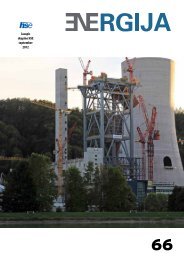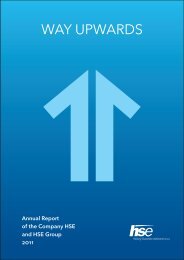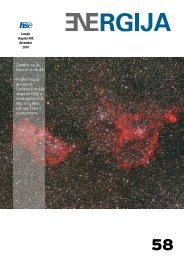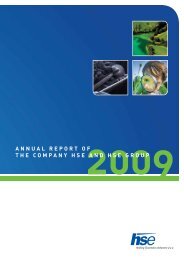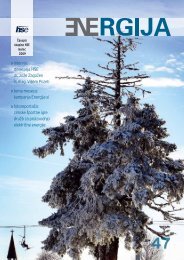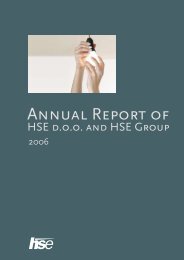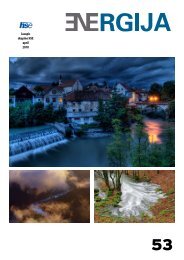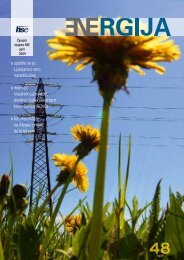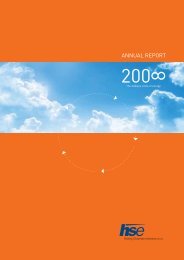Annual report - HSE
Annual report - HSE
Annual report - HSE
You also want an ePaper? Increase the reach of your titles
YUMPU automatically turns print PDFs into web optimized ePapers that Google loves.
3.2 Responsibility to the natural environment<br />
Environment-friendly<br />
The <strong>HSE</strong> Group designed its environmental policy at the very beginning of its operation. Its<br />
basic components can be summarised as follows:<br />
• to produce electricity with a minimum impact on the environment;<br />
• to observe all legal standards and recommendations;<br />
• to introduce the best technologies available in order to minimise the impact on the<br />
environment;<br />
• to promote development of RES;<br />
• to achieve a partnership with local communities and together solve environmental issues<br />
and plan for sustainable development of electricity production;<br />
• to achieve sustainable operation and development of energy capacities.<br />
All electricity-producing companies in the <strong>HSE</strong> Group and the controlling company have<br />
the ISO 9001 international quality certificate and the ISO 14001 international environmental<br />
certificate. Through consistent observance of these standards, the companies ensure<br />
safe and environment-friendly production of electricity in all hydropower plants. Thanks<br />
to environmental rehabilitation and modernisation, both thermal power plants also<br />
introduced more environment-friendly technologies, while PV was among the first<br />
coalmines in the world to demonstrate comprehensive and responsible environmental<br />
management in compliance with the requirements of the respective standard.<br />
Renewable energy sources<br />
<strong>HSE</strong> is aware of its responsibility to the environment in which it operates; therefore, its aim<br />
is to produce electricity from RES and use it rationally.<br />
Following the example of European countries, the area of RES is developing quickly in<br />
Slovenia. The amendment to the Slovene Energy Act (2008) is therefore predominantly<br />
devoted to RES-based electricity and in this context also to guarantees of origin. European<br />
directive 2009/28/EC prescribes for each EU country a general goal regarding the share of<br />
RES in the end consumption of energy for the year 2020. For Slovenia, this share amounts<br />
to 25%.<br />
In terms of volume, energy from hydropower plants is the most important source of E-RES<br />
in Slovenia. The area of renewable energy sources is therefore highly important, both for<br />
operation and the future external image of the Group. In the area of energy supply from<br />
renewable sources, activities were launched in the second half of 2004 in connection with<br />
the establishment of the domestic E-RES market (Blue Energy), participation in the drawing<br />
up of implementing regulations covering this area and international activities relating to<br />
the sale of renewable certificates at home and abroad.<br />
Blue energy<br />
<strong>HSE</strong> designed the Blue Energy project in 2004 in collaboration with distribution companies.<br />
Blue energy stands for electricity produced from environment-friendly, renewable<br />
sources. The project is aimed at encouraging the development of energy production<br />
from renewable sources, establishing the market in such energy and selling this energy<br />
in Slovenia. The Blue energy project enabled Slovenian electricity users on the whole<br />
territory of Slovenia to choose by themselves from which sources the energy they use<br />
will be produced. The sales of Blue Energy began in January 2005. Since 1 July 2007, i.e.<br />
from the full liberalisation of the electricity market onwards, Blue Energy has become<br />
available to business and household customers. We could feel the impact of recession on<br />
the purchase of Blue Energy also in 2012, as the number of buyers dropped from 1,707 (at<br />
the end of 2011) to 1,592 (at the end of 2012. Nevertheless, the amount of Blue Energy sold<br />
increased, from more than 17 GWh (end of 2011) to almost 20 GWh (end of 2012).<br />
All hydropower plants of the <strong>HSE</strong> Group holding the international RECS certificate<br />
participate in the Blue Energy project. In Slovenia, <strong>HSE</strong> and distribution companies sell the<br />
energy produced from renewable sources under the Blue Energy brand. <strong>HSE</strong> guarantees<br />
renewability of energy to its project partners by cashing in an appropriate number of RECS<br />
<strong>Annual</strong> Report <strong>HSE</strong> 2012<br />
3 Social responsibility Report<br />
103




